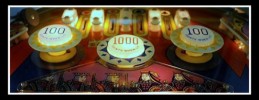
photo by Steve J. O’Brien
Calum Kerr – flash fiction writer, editor and Creative Writing lecturer – recognised that flash fiction was falling into a grey area between short stories and poetry. And so he put forward the idea of a day to celebrate this crafted form, a day in which the world could share these short short stories.
In celebration of National Flash Fiction Day, 16th May, THRESHOLDS teamed up with some of the UK’s best-known writers of the form to bring you a selection of fantastic flashes – stories to read in just a few minutes, that will stay with you all day.
We’ve also been asking our Twitter followers to send us their Tweet-length stories.
Read the best Twitter stories here.
A good story ‘conveys the quality of human life, where contact is much more like the flash of fireflies, in and out, now here, now there, in darkness. Short-story writers see by the light of the flash…’ – Nadine Gordimer

Normal Hours
by David Gaffney
Often we were seen in huddles discussing absurdist theatre. Sometimes, during an argument about cheese-triangles, one of us might bite another man’s nose clean off. If visitors were lucky they’d catch us on a dusky evening dancing together jerkily, and cameras would whir like insect machines.
If a car stopped moving we would climb on top and leer in showing stumpy teeth.
Snapped-off windscreen wipers became weapons to kill each other with when crazed with fear and loneliness.
But it was all right.
Our bodies were removed discretely, without recourse to law. Violent death was natural, the way trees crash down in forests.
Fires were lit in winter and postcards in the gift shop showed us in silhouette against the flames. The most popular was two men hugging in the rain while another absent-mindedly held an umbrella over them.
We each owned a copy and displayed it in our sheds.
~
It happens inside
by David Gaffney
Sheila was a radiologist and she liked to steal things from her neighbour’s flat and x-ray them at work. The first thing she took was his stuffed pheasant because she was interested in how the bird was held together. She discovered that metal rods stood in for bones and there was something solid like a marble at the centre of its skull. Next she x-rayed his nose-hair trimmers and his porcelain model of a VW van. An invisible world was inside these objects, a secret universe. Once she had seen inside all of his things she knew him better than anyone. That’s when she decided to knock on his door and tell him all about it.
She had a folder with all the x-rays in it and knew he would be fascinated by the images. In his bedroom she would tell him everything about the insides of his pillows.
~
David Gaffney is the author of three critically acclaimed flash fiction collections, Sawn-off Tales (2006), Aromabingo (2007) and Edgehill Prize-longlisted The Half-life Of Songs (2010), as well as the novel Never Never (2008). He comes from Cleator Moor in West Cumbria, and now lives in Manchester.
*
 The sea lion who learned to fly
The sea lion who learned to fly
by Vanessa Gebbie
There was a female sea lion learned to fly just the once, on the night of a storm, when waves were higher than they’d ever been, the walls were breached and rocks were strewn with things from the sea, living and dead and somewhere between. She flew to the cattle field behind the strand and fell to earth by the standing stones where a heifer, at her first attempt, had given up trying to give early birth, lain down and died – but her bull calf had come, after all that.
The next day, when the storm had blown itself out, the cowman came down to check that all was well, and found the new calf asleep against the body of a sea lion – the rich milk on his muzzle smelling strangely of salt, and fish, and sea.
~
Vanessa Gebbie writes stories from 10 to 100,000 words, including the novel The Cowards Tale (Bloomsbury), and those in her collections Words from a Glass Bubble and Storm Warning (Salt Modern Fiction). She is also contributing editor of Short Circuit, Guide to the Art of the Short Story (Salt).
*
 A loyal friend
A loyal friend
by Tania Hershman
Most people considered Jacobsen a loyal friend and so they invested everything, every cent they had. When Jacobsen failed to appear at the time they had agreed, no-one worried. Jacobsen’s a friend, they said to each other. He is probably delayed, they said cheerfully, and helped themselves to nuts.
Several hours later, when attempts to contact Jacobsen had failed, they started talking in a different way. This is the point where you smile, they said to one another, and you say, We should have known. This is the point where you call the police.
Jacobsen was never found. It was never even determined where Jacobsen had come from, so to work out where he went was a lost cause. For a long time, his friends, the ones who had considered themselves confidantes and intimates, would meet and talk about him. One by one they began to confess their ignorance. What was his first name? they whispered to each other. What was he really called?
~
Tania Hershman is a former science journalist turned fiction writer. Her first book, The White Road and Other Stories (Salt Modern Fiction, 2008), includes many short stories inspired by science articles. The book was commended, 2009 Orange Award for New Writers, and included in New Scientist’s Best Books of 2008. Her second collection, My Mother Was An Upright Piano: Fictions, 56 very short fictions, has just been published by Tangent Books.
*
 The Egg Pyramid
The Egg Pyramid
by Nuala Ní Chonchúir
There are things you can do when your husband sleeps with your sister. You can sit in your studio and imagine them together, the toad and the mouse. Him moving over her. Her on top of him. You can hear dark skin slap against honey skin; you can hear moans. But he is your toad and she is your mouse – your Diego and your Cristina – so you drown those thoughts because they bring more tears than a blood-letting.
But there are things you can do. You can take the pins from your hair and unweave the plaits. Then you can use a scissors to hack off the lengths. You can scatter the strands on the floor and on your yellow chair, where they lie like snakes. The dogs and monkeys – who still love you – can watch. You can forgo silver rings and turquoise beads. You can dress like a man, in a baggy grey suit and maroon shirt. You can hang your Tijuana dresses in the closet and shut the door on their gaiety.
What else can you do? Well, you can imagine his seed nestling in your sister’s womb and blossoming. You can witness a baby – a boy, let’s say – making a hard melon of her belly. You have never had a ripe stomach. Three times that might have happened for you; three times you bled your baby out before anyone knew that you too could give life. You can look at your sister’s children and ask yourself if they have features that belong to your husband – drooping eyes, full lips, cruelty.
You can count up the seven years you have lived together and you can see that there are plenty of itches to be scratched on both sides. You know that Diego’s urge to scratch burns more than yours; his need is eternal. You can leave your house and take a flat in the heart of Mexico, to create a space for your husband to sulk into and for your sister to wonder in. You can fly to New York then hurry home again, because Diego pulls on you the way mother moon pulls on the sea.
Your husband is an accident that happened to you but he is also your north and south. And, because you love him more than your own skin, you can try to accept and you can try to forgive. You can shrug off the pain that pinches like a body brace and throw laughter bombs out into the world to blow up the hurt that remains.
But, when your sister sleeps with your husband, it is like balancing a pyramid of eggs on a glass platter on the top of your head. You dare not move much for fear of what might happen. The best thing that you can do is to take your brush in one hand, your palette in the other, and sit at your easel and paint. Yes, you can paint.
~
Nuala Ní Chonchúir is a short story writer, novelist and poet, born in Dublin, Ireland, in 1970 and living in Galway. Nuala’s story ‘Peach’, in the Winter 2011 issue of Prairie Schooner, won the Jane Geske Award and has been nominated for a Pushcart Prize. ‘The Egg Pyramid’ won the Dublin Review of Books Flash Fiction Prize in 2011 and was first published on the DRB site. The story inspired an art exhibition by the Making Space Collective and it will appear in Nuala’s fourth short story collection, Mother America, out in June 2012, from New Island.
*
No Man’s Land
by Calum Kerr
The gate closed behind her but she didn’t hear it. She stood on the pavement and felt the heat of the sun through her black suit jacket. She felt she should let out a deep sigh, but she couldn’t.
Instead she walked across the road – no need to check for traffic, not here – and stepped onto the scrub land opposite. It was scabbed and weed-ridden, but in between these scars were patches of lush green grass, unmarred by burning or litter.
She walked to one of these and stepped out of her shoes.
The grass was cool and damp under her soles. It felt clean and fresh, and she felt something, some dirt, washed from by the touch. It felt a little like freedom.
But as her weight crushed the blades, the rough stones that formed the topsoil started to push dents in her feet, causing small stabs of pain.
She thought of her house. It was still there, still waiting for her, after all these months. But what did it have for her but empty rooms, ghosts of blood, and newly reopened questions?
Finally the tears came. Through all this time, through the accusations and the trial, she had not cried once. It had been cited against her in court. But finally she allowed herself to feel all that had been lost.
When the governor told her of her release, he told her how lucky she was.
Her tears fall onto her bare feet and she let the stones dig deep into her skin.
~
Calum Kerr is a writer, editor, lecturer and director of National Flash-Fiction Day. His stories have appeared in Bugged, Litro, Flash, Shoestring, The Pygmy Giant, Ink, Sweat and Tears, The Delinquent, Ether Books, and on BBC Radio 4. His pamphlet 31, is available on Kindle, and his new collection, Braking Distance, was published by Salt in April. Between May 2011 and May 2012 he wrote a flash-fiction every day over at Flash365.
*
 Singles
Singles
by Valerie O’Riordan
Drowned myself with scalding coffee: dash to Casualty. Blisters & skin peeling, pure agony. But the nurses? Married! Waste of fucking time.
~
Valerie O’Riordan is the author of the chapbook, Enough, and editor of the flash-fiction collection, Jawbreakers. She has won the Bristol Prize and been shortlisted for the Bridport Prize for flash fiction. She lives and works in Manchester.
*
Pacifier
Their argument is fuelled by heat and humidity. It is fierce. The air conditioning packed in before
lunch and now, even though it’s almost evening, the atmosphere’s sticky and heavy and hot.
The bald man is sitting on the bed, shirt unbuttoned down to his navel. He has dark patches under his arms.
He says to his wife, who’s standing next to the open window, he says, ‘No.’ And she says, for what feels like the thousandth time, ‘Why not? You -’ she says, ‘It’s always about you. Always about what you want.’
He says, ‘Bah! But you know it’s a stupid idea. Fucking stupid, as fucking stupid as you. Never work. Waste of time. Waste of money.’
And when she’s sick of saying please, sick of his refusal to see sense, to see where his wife’s coming from, she tells him that he can go to hell.
The heat and humidity fuel their anger.
The man, dry-mouthed, bald, sweating and uncomfortable, reminds her of her past. The time she did fucking this, the time she did fucking that, forgot this, let him down that way.
She responds by reminding him.
‘Remember? Not so perfect yourself, eh!’
And then something changes. In an instant. He sees her breast – it’s the way she’s standing – instead of a hidden shadow, he sees shape, skin, a nipple. And she can feel, somehow, the change in him.
Staring, her jaw set and lips pressed together, she hitches up her dress.
And for a moment there is silence.
~
Nik Perring is a writer, teacher of writing, and editor. His short stories have been widely published, as well as being broadcast on radio and read live at literary events. Nik’s first collection of short stories, Not So Perfect (2010) was published by Roast Books. His second collection, FREAKS! (2012) was co-written with Caroline Smailes and published by The Friday Project (HarperCollins). ‘Pacifier’ was first published in Not So Perfect.
With many thanks to all the authors for their kind permission
to print these stories.
~
We’ve been asking our Twitter followers to send us their own flash fictions – in the form of Tweet-length stories.



Is it too late for me to say that I actually really, really dig some of the stories on this page?
So maybe, like all writing, it’s really just about um, (subjective) taste and, um, weeding out the (subjective) Duds from the Miniature Masterpieces?
You’re not, um, back-pedalling there, are you Steve?